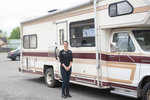

The mobile unit may not have many aesthetic frills and it may not stand out too much in traffic, but Lisa Striedinger hopes that soon the community will know what happens inside the nondescript vehicle.
For the past week, she’s been driving around a mobile unit that serves as the base of operation of the nonprofit Friends Without Homes. She uses the organization to serve as the bridge between the homeless population and the resources designed to help them.
“Our goal is to make homelessness here in Lewis County rare, brief and one time,” she said.
Striedinger, for the past couple of years, has worked closely with the homeless population of Lewis County, where she’s gotten to know many of those who are chronically homeless.
As a peer counselor, she said she’s become well acquainted with what resources are available, but added that many in the homeless community aren’t aware of the resources or how to make the initial contact.
That’s where Friends Without Homes comes in. A meeting with an individual typically lasts five to 15 minutes. A follow-up meeting will probably last a little bit longer. Striedinger’s dog sits in during the meeting, and has been trained as a domestic violence support animal, and can often sense the person’s anxiety.
The vehicle is stocked with donated items like tents, sleeping bags and tarps. She said they have the opioid overdose-reversing drug Narcan, or naloxone, onboard, in case an emergency arises.
Handing out those kind of items out isn’t a solution to a problem, said Striedinger, but, she hopes, it will keep people alive long enough for a solution to be found.
During the interview, Striedinger will provide information on how the person can seek the help they need. She’ll let them know about the process, and what information will be required of them. She’ll tell them about the vulnerability index that dictates who gets into certain shelters and the invasive questions that will be asked. Questions like, have they had run-ins with law enforcement? Are they on the run from someone? Do they suffer from substance abuse disorder? Many might have the instinct to lie when asked such questions, but honest answers are likely what will allow them to get into the shelter, she said.
Striedinger’s ultimate goal is to have a permanent location that can house a 365-day shelter. That goal’s contingent on obtaining grant funding and talks with city and county officials.
Currently, Friends Without Homes depends on donations and the volunteer work of 11 volunteers. They also work with a network of individuals living in Morton, Pe Ell and Onalaska, who Striedinger can contact if she catches wind of someone in a crisis situation in one of those communities.
Striedinger’s drive comes in-part from her experience as a homeless person herself.
“It was just an unfortunate set of circumstances that allowed me not to go home when I needed to,” she said, adding later that she also dealt with alcoholism. Since then, she’s become a licensed peer counselor and studied chemical dependency in college.
She obtained her license to operate as a nonprofit in August 2018, and started doing the sort of outreach she does now out of her personal vehicle. She’s gone through a few recreational vehicles before getting the one that she works out of now.
After getting involved with the statewide Resident Action Project, designed to support legislation that combats homelessness and to advocate for access to affordable housing, Striedinger said she’s gotten to help fight homelessness on a larger stage and meet some key players in the issue.
But the crux of Friends Without Homes’ goal lies within Lewis County. Striedinger said she plans to split her time between Centralia and Chehalis. She wants to partner with local churches, both to find a place to park and to work together on a common goal.
Toward the front of the vehicle, there are five pictures of Lewis County individuals that have died, either in homelessness or in the midst of their struggle with mental illness.
“These are people,” she said, saying she doesn’t want to hang up any more pictures.
Streidinger can be reached at 971-340-6801.